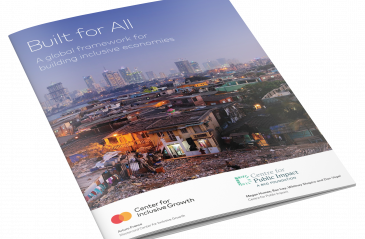
Systemic funding architecture: A proposition to catalyze urban climate finance

The @WorldBank has a new finance facility to help host countries support refugees
Share articleThe Global Concessional Funding Facility is for middle income countries like Jordan and Lebanon
Share articleFor @danielkbalke working at the @worldbank helps him fight inequity around the world
Share articleWe put our vision for government into practice through learning partner projects that align with our values and help reimagine government so that it works for everyone.
OK, so the “Global Concessional Funding Facility” (GCFF) is hardly the catchiest of titles. But it's a fair bet that those who benefit from it won't be complaining. And there are plenty of them.
The World Bank and the UN set up the GCFF last year. Their aim was to help a number of middle-income countries, such as Jordan and Lebanon, which are currently hosting about six million refugees between them and have to cope with the additional costs associated with their arrival. The GCFF enables these countries to invest in much-needed resources, such as adequate healthcare and new infrastructure to ensure that the new arrivals will be able to count on reliable power supplies.
For Daniel Balke, a strategy and operations officer at the Bank, it is a good example of concrete delivery, exactly the type of project which showcases the necessity of development assistance, at a time of funding pressures in developed countries. “I think that people, no matter where you are or what side of the aisle you are on, like results,” he says. “Are we perfect? Absolutely not. Have we figured it all out? No. Do we need to adapt and evolve as the needs change? Absolutely. And this is where we are focusing: creating an evolving, increasingly valuable GCFF for our existing partners and our potential new partners.”
Having opted against trying his luck on the professional tennis circuit (as a student, he had four years of Division 1 NCAA tennis), Balke began his career as an elementary school teacher in Navajo Nation as part of the Teach for America programme. He followed this by working as a field organiser in Barack Obama's first presidential campaign. Both roles, he says, afforded him rich experiences and valuable life lessons.
“Much as I love my job now, these were perhaps my most invigorating experiences,” he recalls. “What those experiences gave me was a deep motivation to devote my career towards fighting structural inequities. The kids I was teaching on the Navajo reservation face these inequities in so many manifestations - in terms of poverty, health, challenges with family, and so on. And organising involved bringing individual people from all different backgrounds together around a common goal - in a sense I was doing that in the classroom too.”
Balke's interesting career journey continued onwards, including roles in the private sector and the US Treasury, which is where he first came into contact with World Bank president, Jim Yong Kim. At the time, Kim was not yet president but had been proposed for the role by the US government. Balke found himself putting his organising skills to work in support of his nomination.
“The Treasury assembled a small team to accompany Dr Kim around the world, because it's the board of directors which decides who should be the next president,” says Balke. “We visited many countries in a short period of time, and I quickly became enamoured of his absolute obsession with fighting for equity and fighting against poverty. I made it clear that I would love to work for him and, although it took a bit of time, ultimately an opportunity at the Bank emerged.”
Balke - who juggles a number of different priorities at the Bank - nonetheless focuses much of his attention on countries in the Middle East and North Africa, with the GCFF itself an extension of a facility launched earlier to fill the financing gap for Jordan and Lebanon. There, through the innovative use of grants from donor countries, US$1 in grants can leverage about US$4 in concessional financing (loans that are extended on terms substantially more generous than these middle-income countries typically receive). Three months after receiving initial pledges of US$140 million in grants, the GCFF approved funding to support two projects in Jordan - amounting to US$340 million in concessional financing - which provided work permits for 130,000 Syrian refugees and reinforced water infrastructure in communities hosting refugees.
“What we're focused on is creating the strongest value proposition possible through the work that our facility is doing,” he says. “This means that, with the GCFF, we want to prepare for future crises and make sure there is no delay in support to affected countries. For me, it is about being a catalytic or organising force to bring together different stakeholders and partners - all of which have different backgrounds - on a shared goal and a shared interest. So the skill set I picked up as a teacher and organiser has proven very valuable.”
It is clear that the complex web of factors which underpin the refugee crisis means that there is no overnight fix. Balke, though, is far from pessimistic. “It's important to think about what success looks like,” he points out. “But I am always optimistic. One of Jim Kim's great beliefs is that ‘optimism is a moral choice'. If we at the Bank can't be optimistic, with all our resources, then how can we expect the folks we work with to be optimistic?”
He goes on to say that there are “plenty of good ideas out there”, including many which surfaced at the recent Solutions Summit in London, which he attended. “There are a lot of groups talking about the challenges - both for refugees and host communities,” he says. “It's just a case of ensuring that the proposals they come up with are founded on what the reality is on the ground, and ensuring that they are both sustainable and scalable.”
No doubt the refugee crisis will continue to play out over the coming months and years but, looking further ahead, Balke pinpoints other issues which will also dominate the horizon - such as climate change, infrastructure and fragility, conflict and violence. “Aligning all of these stars and getting positive forces working in the same direction will, I think, be critical,” he says. “It's a big ask because it involves people working in new ways and seeing things differently, but we have to get it right.”
And there's no doubt he believes he's in the right place to make a contribution, adding that his time at the Bank has “far exceeded” his already high expectations. “Any organisation has its challenges and frustrations, but one thing you can never take away from the Bank is its underlying mission of ending extreme poverty and boosting shared prosperity,” he concludes. “What this means practically is fighting for equity in the world for those who struggle to have it. There's no better place to make a difference.”












